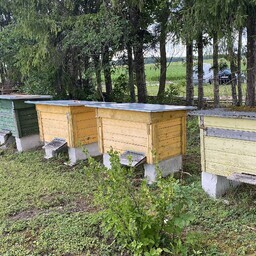See suvi on olnud vihmane ja jahe. See on
pannud mesinikud raske olukorda
. Mesilased ei saa nii palju mett toota kui tavaliselt.
pannud mesinikud raske olukorda
Tõlge fraasile: pannud mesinikud raske olukorda
EN
put beekeepers in a difficult situation
Baltikumi suurima mesilasettevõtte juht Taavi Tull ütleb, et
mesisaak on poole väiksem
kui eelmistel aastatel. Mesilased toovad mett mai, juuni ja juuli alguses. Aga sel suvel oli palju vihma. Mesilased ei lenda vihmaga.
mesisaak on poole väiksem
Tõlge fraasile: mesisaak on poole väiksem
EN
honey yield is half as much
Enamik mett toodetakse enne juuli keskpaika. Tavaliselt toodetakse 90% mett enne seda. Ülejäänud 10% toodetakse hiljem. Aga sel aastal on mesisaak väga väike.
Eesti Kutseliste Mesinike Ühingu esimees Mario Kalvet ütleb, et see mesiaasta on katastroofiline. Mesinikud peavad tõstma mee hinda. Vastasel juhul ei saa nad oma tööst välja. Kalvet arvab, et see on
üldine tendents Eestis
sel aastal.
üldine tendents Eestis
Tõlge fraasile: üldine tendents Eestis
EN
general trend in Estonia
Ühing kogub infot mesinike olukorra kohta. Nad plaanivad
pöörduda valitsuse poole abi saamiseks
. Mesinikud loodavad, et valitsus aitab neid.
pöörduda valitsuse poole abi saamiseks
Tõlge fraasile: pöörduda valitsuse poole abi saamiseks
EN
appeal to the government for help
This summer has been rainy and cold. It has put beekeepers in a difficult situation. Bees cannot produce as much honey as usual.
The head of the largest beekeeping company in the Baltics, Taavi Tull, says that the honey harvest is half less than in previous years. Bees bring honey in May, June, and early July. But this summer, there was a lot of rain. Bees do not fly in the rain.
Most honey is produced before mid-July. Usually, 90% of honey is produced before that. The remaining 10% is produced later. But this year, the honey harvest is very small.
The chairman of the Estonian Professional Beekeepers' Association, Mario Kalvet, says that this honey year is catastrophic. Beekeepers have to raise the price of honey. Otherwise, they cannot make ends meet. Kalvet believes that this is a general trend in Estonia this year.
The association is collecting information about the situation of beekeepers. They plan to turn to the government for help. Beekeepers hope that the government will help them.

